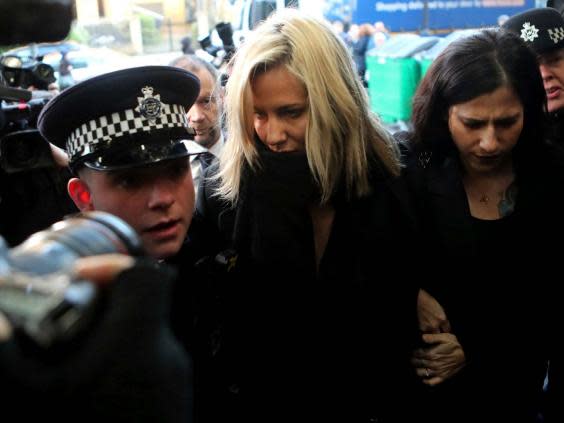Caroline Flack: CPS insists prosecutions are 'in public interest' amid criticism of 'show trial'

The Crown Prosecution Service has defended its decision-making after Caroline Flack’s management criticised what it called a “show trial” over alleged domestic abuse.
Flack, a television presenter, hosted ITV’s Love Island until she stepped down in December after being charged with assault by beating.
The 40-year-old denied the allegations and her boyfriend, Lewis Burton, did not support the prosecution.
Flack was found dead at her London home on Saturday after taking her own life, weeks before she was due to go on trial.
News of her death prompted a flood of tributes from celebrities and friends, with many questioning the decision to prosecute her.
Francis Ridley, of Money Talent Management, said Flack had been “under huge pressure” because of the case.
"The Crown Prosecution Service (CPS) pursued this when they knew not only how very vulnerable Caroline was but also that the alleged victim did not support the prosecution and had disputed the CPS version of events,” he added.
"The CPS should look at themselves today and how they pursued a show trial that was not only without merit but not in the public interest. And ultimately resulted in significant distress to Caroline."
The CPS refused to comment on the specifics of Flack’s case but defended the process by which it decides to charge people with an offence.
A spokesperson said prosecutors review every case referred to them by police and provide legal advice during investigations.
“We do not decide whether a person is guilty of a criminal offence - that is for the jury, judge or magistrate - but we must make the key decision of whether a case should be put before a court,” a statement added.
It said every decision is based on a two-stage test in the Code for Crown Prosecutors, which is applied equally to all types of crime.
Prosecutors must consider if the evidence supports a realistic prospect of conviction, meaning a court is more likely than not to find the defendant guilty, and if it is “in the public interest” to prosecute.
“That means asking questions including how serious the offence is, the harm caused to the victim, the impact on communities and whether prosecution is a proportionate response,” the CPS said.

“Guidance for prosecutors when considering domestic abuse allegations gives specific advice on how to proceed when a complainant does not want to support a prosecution, which can often be a feature of these difficult cases.
“It provides guidance on the information required to understand why a complainant may withdraw support and the different options that should be considered, including proceeding without the complainant’s support if other evidence is available.”
Prosecutors can proceed with charges without a victim’s support in cases including alleged domestic abuse and sexual assault, in order to guard against coercion or intimidation by abusers.
The CPS said it has also recently updated its guidance for cases involving defendants with mental health conditions.
Flack, who was described as "vulnerable" by her management, was not allowed to have any contact with Mr Burton as part of her bail conditions.
She was seen crying at Highbury Corner Magistrates' Court in December. After the hearing, Flack posted a statement on Instagram saying it would be a “relief” to give her side of the story when she could.
Burton, who had dialled 999 from Flack’s home in Islington on 12 December, refuted allegations that she hit him with a lamp.
He said his heart was “broken” following her death and vowed to “get all the answers” in an emotional tribute on Instagram.
Burton added: “I will be your voice baby I promise I will ask all the questions you wanted and I will get all the answers nothing will bring you back but I will try make you proud every day. I love you with all my heart.”
As well as criticism of the CPS, Flack’s death has sparked scrutiny of news organisations and social media over their treatment of the presenter through her career, personal life and the criminal case.

By Sunday afternoon, an online petition calling for a government inquiry into “the practices and policies of mainstream media organisations and social media platforms in their efforts to protect members of the public from harm” had more than 150,000 signatures.
Flack is the fourth person linked to ITV2 dating programme Love Island to have killed themselves.
Sophie Gradon, who appeared as a contestant in the show in 2016, was found dead at her home in 2018 at the age of 32. Her boyfriend Aaron Armstrong, who had found her body, killed himself three weeks later. He was 25.
Mike Thalassitis, who appeared in the 2017 series, was 26 when he was found dead in a park in March last year.
Following the news of Flack's death, an ITV spokesperson said: “Everybody at Love Island and ITV is shocked and saddened by this desperately sad news.
"Caroline was a much loved member of the Love Island team and our sincere thoughts and condolences are with her family and friends.“
Channel 4 has said it will no longer air The Surjury, a new cosmetic surgery-based TV series that Flack had been expected to host.
Flack's other TV presenting roles have included Gladiators, I'm A Celebrity... Get Me Out Of Here! NOW!, The X Factor and The Xtra Factor. She won Strictly Comes Dancing in 2014 with professional dancer Pasha Kovalev.
Read more
The life and career of former Love Island presenter Caroline Flack
Lewis Burton pays emotional tribute to Caroline Flack

